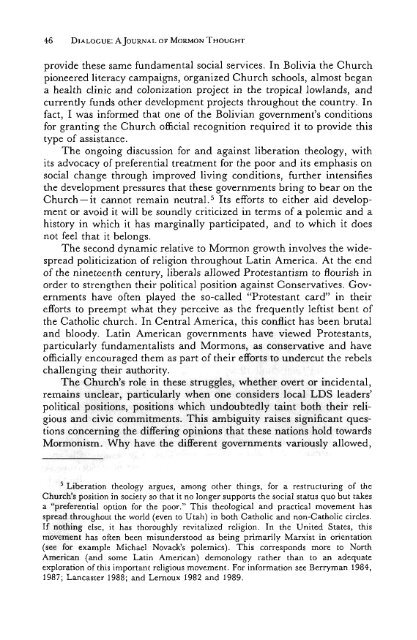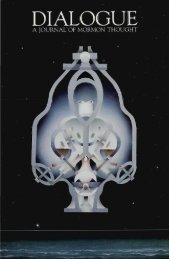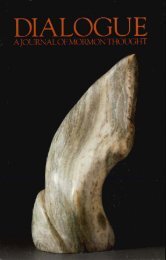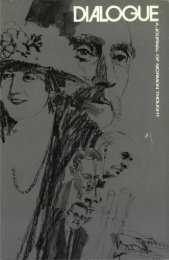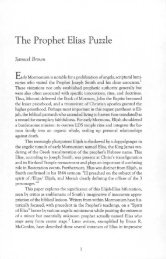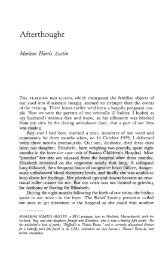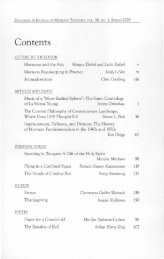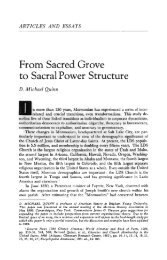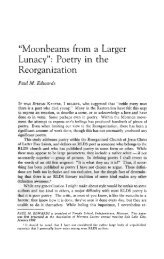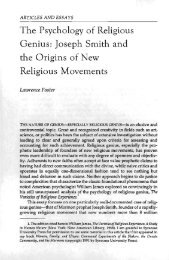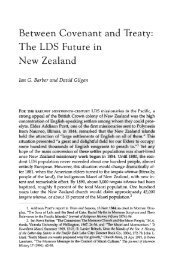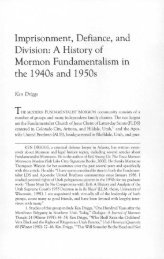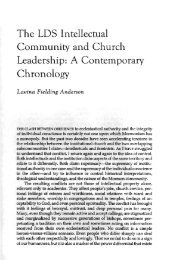Dialogue, Volume 25, Number 2 - Dialogue – A Journal of Mormon ...
Dialogue, Volume 25, Number 2 - Dialogue – A Journal of Mormon ...
Dialogue, Volume 25, Number 2 - Dialogue – A Journal of Mormon ...
You also want an ePaper? Increase the reach of your titles
YUMPU automatically turns print PDFs into web optimized ePapers that Google loves.
46 DIALOGUE: A JOURNAL OF MORMON THOUGHT<br />
provide these same fundamental social services. In Bolivia the Church<br />
pioneered literacy campaigns, organized Church schools, almost began<br />
a health clinic and colonization project in the tropical lowlands, and<br />
currently funds other development projects throughout the country. In<br />
fact, I was informed that one <strong>of</strong> the Bolivian government's conditions<br />
for granting the Church <strong>of</strong>ficial recognition required it to provide this<br />
type <strong>of</strong> assistance.<br />
The ongoing discussion for and against liberation theology, with<br />
its advocacy <strong>of</strong> preferential treatment for the poor and its emphasis on<br />
social change through improved living conditions, further intensifies<br />
the development pressures that these governments bring to bear on the<br />
Church —it cannot remain neutral. 5 Its efforts to either aid development<br />
or avoid it will be soundly criticized in terms <strong>of</strong> a polemic and a<br />
history in which it has marginally participated, and to which it does<br />
not feel that it belongs.<br />
The second dynamic relative to <strong>Mormon</strong> growth involves the widespread<br />
politicization <strong>of</strong> religion throughout Latin America. At the end<br />
<strong>of</strong> the nineteenth century, liberals allowed Protestantism to nourish in<br />
order to strengthen their political position against Conservatives. Governments<br />
have <strong>of</strong>ten played the so-called "Protestant card" in their<br />
efforts to preempt what they perceive as the frequently leftist bent <strong>of</strong><br />
the Catholic church. In Central America, this conflict has been brutal<br />
and bloody. Latin American governments have viewed Protestants,<br />
particularly fundamentalists and <strong>Mormon</strong>s, as conservative and have<br />
<strong>of</strong>ficially encouraged them as part <strong>of</strong> their efforts to undercut the rebels<br />
challenging their authority.<br />
The Church's role in these struggles, whether overt or incidental,<br />
remains unclear, particularly when one considers local LDS leaders'<br />
political positions, positions which undoubtedly taint both their religious<br />
and civic commitments. This ambiguity raises significant questions<br />
concerning the differing opinions that these nations hold towards<br />
<strong>Mormon</strong>ism. Why have the different governments variously allowed,<br />
5 Liberation theology argues, among other things, for a restructuring <strong>of</strong> the<br />
Church's position in society so that it no longer supports the social status quo but takes<br />
a "preferential option for the poor." This theological and practical movement has<br />
spread throughout the world (even to Utah) in both Catholic and non-Catholic circles.<br />
If nothing else, it has thoroughly revitalized religion. In the United States, this<br />
movement has <strong>of</strong>ten been misunderstood as being primarily Marxist in orientation<br />
(see for example Michael Novack's polemics). This corresponds more to North<br />
American (and some Latin American) demonology rather than to an adequate<br />
exploration <strong>of</strong> this important religious movement. For information see Berryman 1984,<br />
1987; Lancaster 1988; and Lernoux 1982 and 1989.


